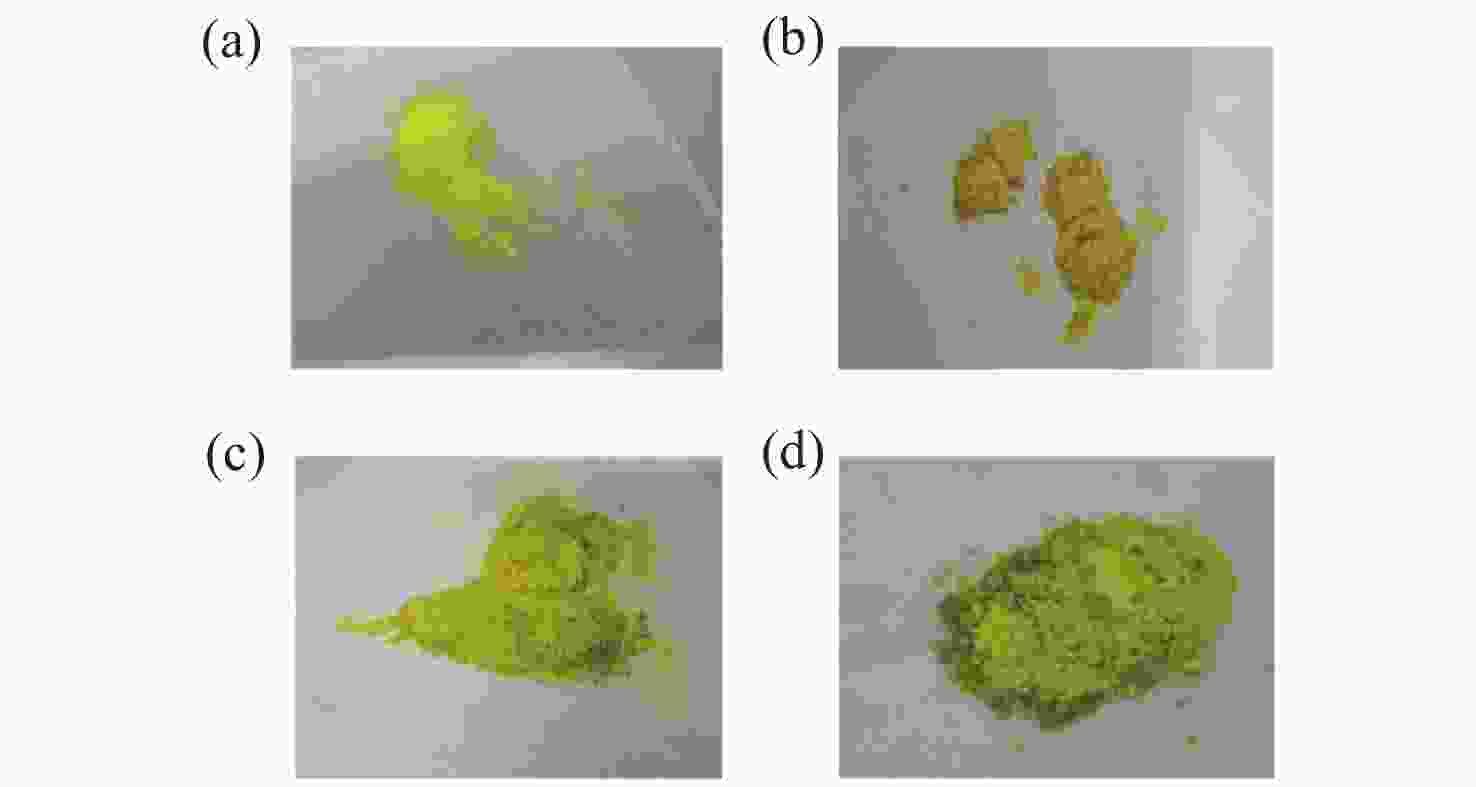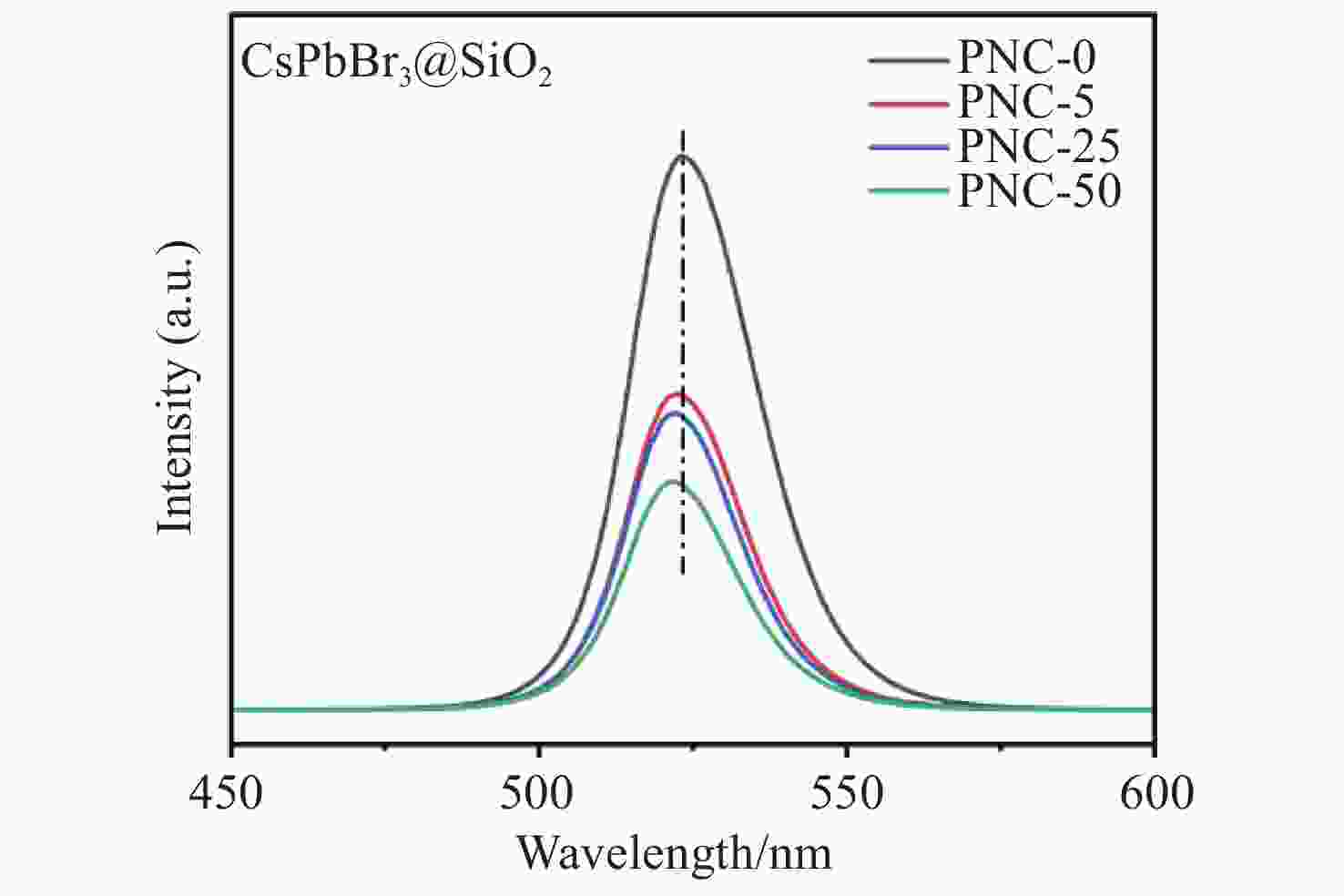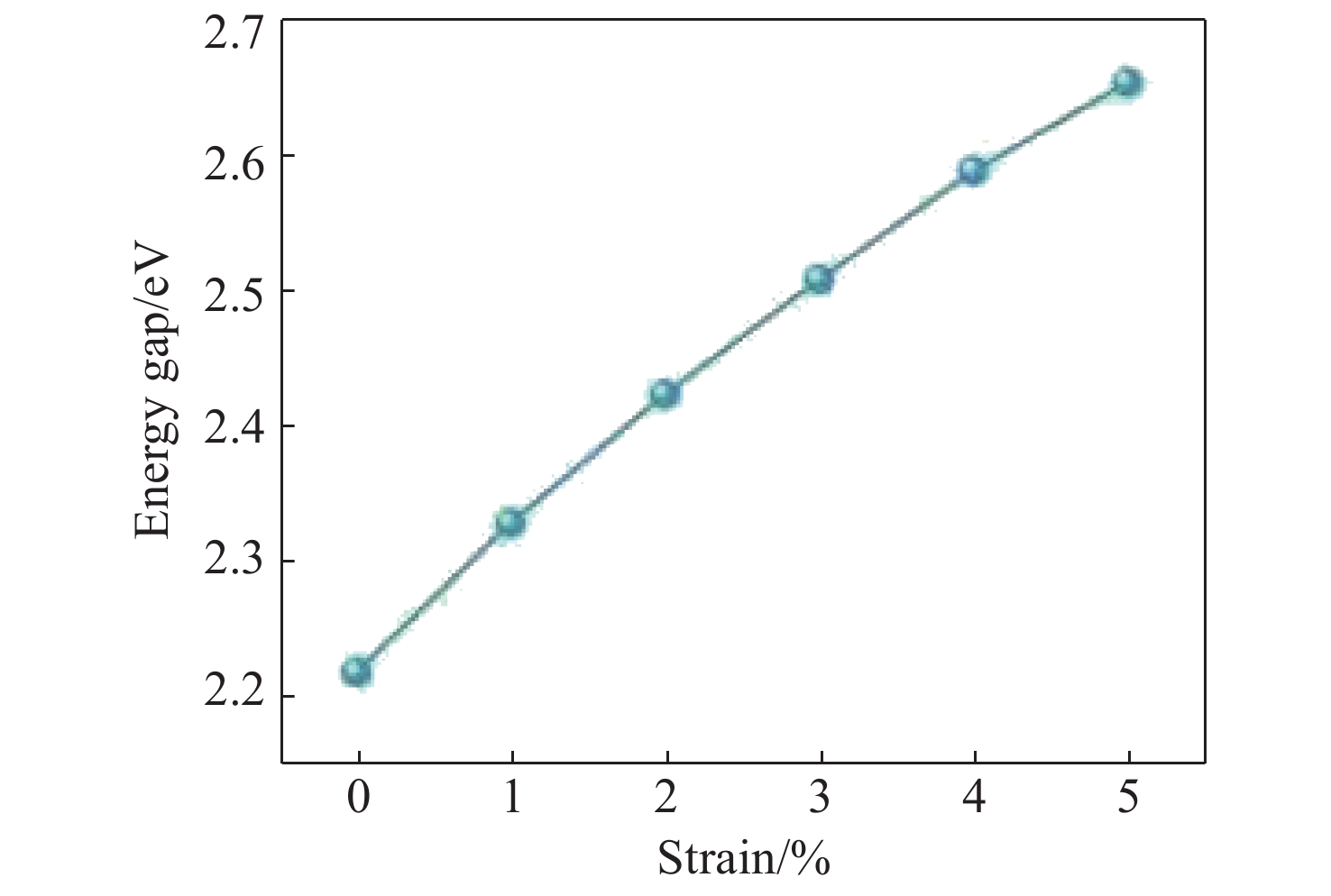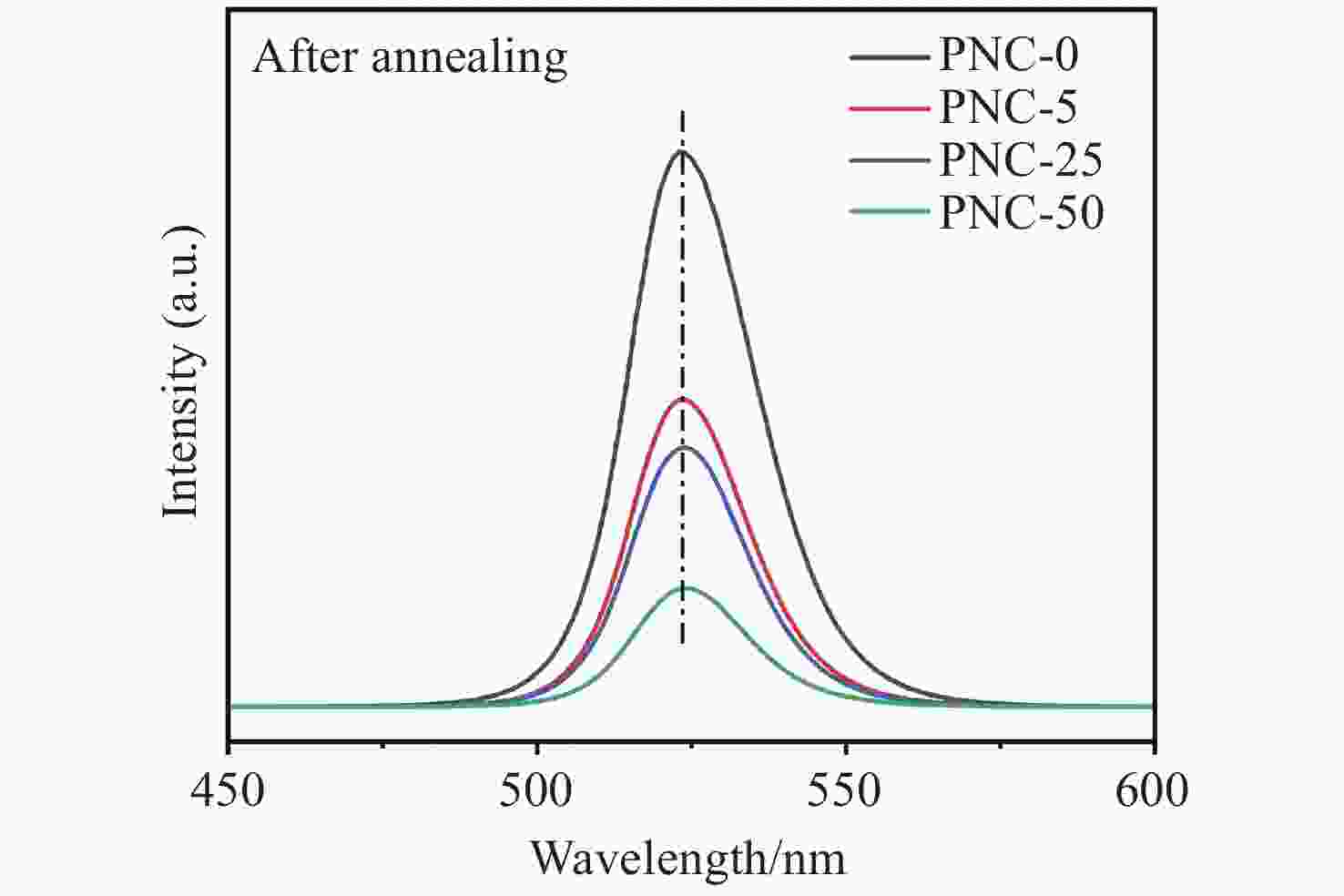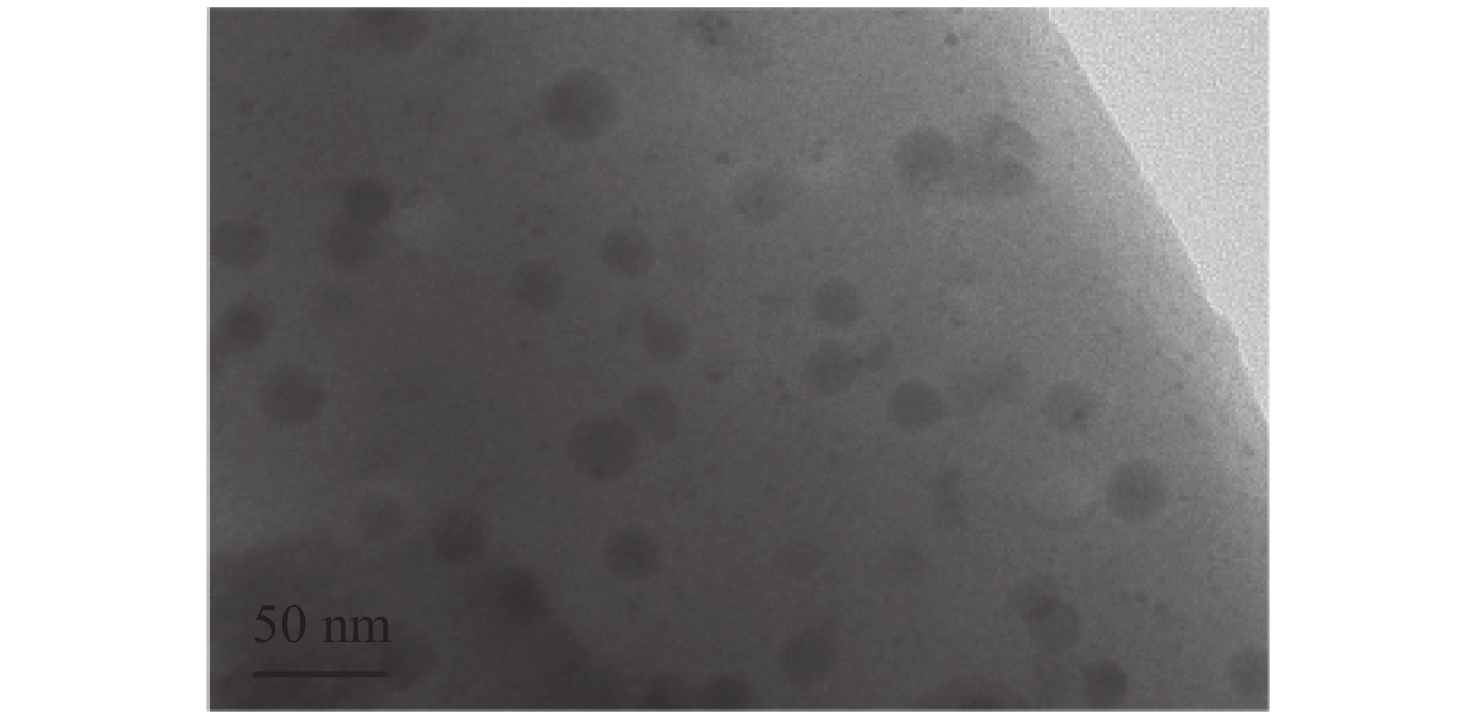-
摘要:
钙钛矿材料具有优异的光学性能和较高的载流子迁移率,成为空间太阳能电池领域极具竞争力的材料。然而空间粒子辐照容易改变材料结构和光学性能,导致其性能下降。为了探究电子辐照对CsPbBr3材料结构与光学特性的影响规律,本文开展了CsPbBr3材料电子辐照实验,利用高分辨透射电子显微镜表征CsPbBr3纳米晶微观形貌,并通过X射线衍射分析和X射线光电子能谱分析进一步探究晶体结构的变化趋势。研究发现:电子辐照后CsPbBr3纳米晶形貌变得粗糙,尺寸明显减小,并且纳米晶在高剂量电子辐照下变得紧凑,形成纳米团簇。其次,通过稳态紫外-可见吸收光谱图与光致发光谱图表征CsPbBr3材料的光学性能,并利用第一性原理计算分析辐照后晶格膨胀带来的带隙变化。研究证明电子辐照后纳米晶颜色加深,影响钙钛矿的透光率,进而增强了样品对光的吸收性能,同时电子辐照能够分解CsPbBr3纳米晶,特别是高剂量辐照后其光致发光性能降低了53.7%~78.6%。本文研究结果为钙钛矿纳米晶空间辐射损伤机理及应用研究提供了数据支撑。
-
关键词:
- CsPbBr3钙钛矿 /
- 电子辐照 /
- 晶体结构 /
- 光学性能
Abstract:With excellent optical properties and high carrier mobility, perovskite materials have become highly competitive materials in the field of space solar cells. However, space particle irradiation can change the structure and optical properties of materials, leading to a rapid degradation of device performance. In order to investigate the influence of electron irradiation on the structure and optical properties of CsPbBr3 nanocrystals, we conducted electron irradiation experiments on CsPbBr3 materials, characterized the microscopic morphology of CsPbBr3 nanocrystals by high-resolution transmission electron microscopy. Moreover, we investigated the variation trend of crystal structure by X-ray diffraction analysis and X-ray photoelectron spectroscopy analysis. The results revealed electron irradiation caused the CsPbBr3 nanocrystals to become rough and significantly decrease in size. The nanocrystal became compact and formed nanocluster under high-dose electron irradiation. Furthermore, the optical properties of CsPbBr3 materials were characterized using steady-state UV-Vis absorption spectra and photoluminescence spectra. The analysis of lattice expansion-induced bandgap changes after irradiation was performed using first principles calculations. It is demonstrated that electron irradiation deepened the color of nanocrystals and affected the light transmittance of CsPbBr3 nanocrystalline, thereby enhancing the optical absorption performance of the samples. However, electron irradiation also led to the decomposition of CsPbBr3 nanocrystals, resulting in a significant reduction in luminescence intensity of the CsPbBr3 by 53.7%−78.6% after high-dose irradiation. These findings provide valuable data support for the study of spatial radiation damage mechanisms and the application of perovskite nanocrystals.
-
Key words:
- CsPbBr3 perovskite /
- electron radiation /
- crystal structure /
- optical properties
-
-
[1] 翟彤彤, 李云辉, 朱建伟, 等. 卤化物钙钛矿纳米晶的电化学发光研究进展[J]. 分析化学,2023,51(5):642-651.ZHAI T T, LI Y H, ZHU J W, et al. Progress in electrochemiluminescence of halide perovskites nanocrystals[J]. Chinese Journal of Analytical Chemistry, 2023, 51(5): 642-651. (in Chinese) [2] 王婷, 魏奇, 付强, 等. 钙钛矿光伏电池封装材料与工艺研究进展[J]. 应用化学,2022,39(9):1321-1344.WANG T, WEI Q, FU Q, et al. Review of perovskite photovoltaic cell encapsulation material and technology[J]. Chinese Journal of Applied Chemistry, 2022, 39(9): 1321-1344. (in Chinese) [3] 董国华, 郝丽娟, 张文治, 等. 碳量子点纳米材料在铅卤钙钛矿太阳能电池中的应用研究进展[J]. 应用化学,2022,39(5):707-722.DONG G H, HAO L J, ZHANG W ZH, et al. Recent progress on the application of carbon quantum dots nano-materials in lead halogen perovskite solar photoelectric devices[J]. Chinese Journal of Applied Chemistry, 2022, 39(5): 707-722. (in Chinese) [4] GREEN M A, HO-BAILLIE A, SNAITH H J. The emergence of perovskite solar cells[J]. Nature Photonics, 2014, 8(7): 506-514. doi: 10.1038/nphoton.2014.134 [5] STOUMPOS C C, KANATZIDIS M G. The renaissance of halide perovskites and their evolution as emerging semiconductors[J]. Accounts of Chemical Research, 2015, 48(10): 2791-2802. doi: 10.1021/acs.accounts.5b00229 [6] LIU X, LI J, WANG X, et al. Inorganic lead-based halide perovskites: from fundamental properties to photovoltaic applications[J]. Materials Today, 2022, 61: 191-217. doi: 10.1016/j.mattod.2022.11.002 [7] TU Y G, WU J, XU G N, et al. Perovskite solar cells for space applications: progress and challenges[J]. Advanced Materials, 2021, 33(21): 2006545. doi: 10.1002/adma.202006545 [8] 吴闻迪, 余婷, 陶蒙蒙, 等. 掺铥光纤γ射线辐照效应实验研究[J]. 中国光学,2018,11(4):610-614. doi: 10.3788/co.20181104.0610WU W D, YU T, TAO M M, et al. Experimental investigation of gamma-ray irradiation effect on Tm-doped fibers[J]. Chinese Optics, 2018, 11(4): 610-614. (in Chinese) doi: 10.3788/co.20181104.0610 [9] LANG F, JOŠT M, BUNDESMANN J, et al. Efficient minority carrier detrapping mediating the radiation hardness of triple-cation perovskite solar cells under proton irradiation[J]. Energy &Environmental Science, 2019, 12(5): 1634-1647. [10] KANAYA S, KIM G M, IKEGAMI M, et al. Proton irradiation tolerance of high-efficiency perovskite absorbers for space applications[J]. The Journal of Physical Chemistry Letters, 2019, 10(22): 6990-6995. doi: 10.1021/acs.jpclett.9b02665 [11] BOLDYREVA A G, AKBULATOV A F, TSAREV S A, et al. γ-Ray-induced degradation in the triple-cation perovskite solar cells[J]. The Journal of Physical Chemistry Letters, 2019, 10(4): 813-818. doi: 10.1021/acs.jpclett.8b03222 [12] BOLDYREVA A G, FROLOVA L A, ZHIDKOV I S, et al. Unravelling the material composition effects on the gamma ray stability of lead halide perovskite solar cells: MAPbI3 breaks the records[J]. The Journal of Physical Chemistry Letters, 2020, 11(7): 2630-2636. doi: 10.1021/acs.jpclett.0c00581 [13] 冯远皓, 柯小行, 隋曼龄. 无机双钙钛矿太阳能电池材料Cs2AgBiBr6在电子束辐照下的降解行为研究[J]. 电子显微学报,2020,39(1):1-8.FENG Y H, KE X X, SUI M L. Effect of electron irradiation on inorganic double perovskite solar cell material Cs2AgBiBr6[J]. Journal of Chinese Electron Microscopy Society, 2020, 39(1): 1-8. (in Chinese) [14] GAO L, TAO K ZH, SUN J L, et al. Gamma-ray radiation stability of mixed-cation lead mixed-halide perovskite single crystals[J]. Advanced Optical Materials, 2022, 10(3): 2102069. doi: 10.1002/adom.202102069 [15] DANG ZH Y, SHAMSI J, PALAZON F, et al. In situ transmission electron microscopy study of electron beam-induced transformations in colloidal cesium lead halide perovskite nanocrystals[J]. ACS Nano, 2017, 11(2): 2124-2132. doi: 10.1021/acsnano.6b08324 [16] CHEN X Y, WANG ZH W. Investigating chemical and structural instabilities of lead halide perovskite induced by electron beam irradiation[J]. Micron, 2019, 116: 73-79. doi: 10.1016/j.micron.2018.09.010 [17] HOVINGTON P, DROUIN D, GAUVIN R. CASINO: A new Monte Carlo code in C language for electron beam interaction—part I: description of the program[J]. Scanning, 1997, 19(1): 1-14. [18] KRESSE G, FURTHMÜLLER J. Efficient iterative schemes for ab initio total-energy calculations using a plane-wave basis set[J]. Physical Review B, 1996, 54(16): 11169-11186. doi: 10.1103/PhysRevB.54.11169 [19] KHUILI M, FAZOUAN N, EL MAKARIM H A, et al. First principle study of structural, electronic, optical and electrical properties of Ga doped ZnO with GGA and mBJ approximations[J]. Journal of Physics:Conference Series, 2016, 758(1): 012024. [20] HONG Y K, PARK D H, PARK S K, et al. Tuning and enhancing photoluminescence of light-emitting polymer nanotubes through electron-beam irradiation[J]. Advanced Functional Materials, 2009, 19(4): 567-572. doi: 10.1002/adfm.200801088 [21] MELONI S, PALERMO G, ASHARI-ASTANI N, et al. Valence and conduction band tuning in halide perovskites for solar cell applications[J]. Journal of Materials Chemistry A, 2016, 4(41): 15997-16002. doi: 10.1039/C6TA04949D [22] WANG SH, MA J Q, LI W C, et al. Temperature-dependent band gap in two-dimensional perovskites: thermal expansion interaction and electron–phonon interaction[J]. The Journal of Physical Chemistry Letters, 2019, 10(10): 2546-2553. doi: 10.1021/acs.jpclett.9b01011 [23] GLEADOW A J W, DUDDY I R. A natural long-term track annealing experiment for apatite[J]. Nuclear Tracks, 1981, 5(1-2): 169-174. doi: 10.1016/0191-278X(81)90039-1 -






 下载:
下载:

